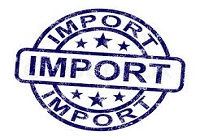What is import duty and how does it affect prices and economy
The Indian Government will impose an import duty of 10 per cent on wheat effective from March 31 next year, reinstating tariffs after a gap of eight years. This reinstatement is aimed to curb overseas purchases when domestic stocks are in ample amount.
WHAT IS AN IMPORT DUTY?
An import duty or tariff is like a tax on the import of a commodity. An import duty may be unit (a pre determined percentage on each unit) or ad valorem (in proportion to the value of the unit on which it is imposed) or a mixture of the two.
Both export duty and import duty are a part of custom duty or custom tariff.
It is a way through which balance of payment of a country are adjusted.
EFFECTS OF IMPORT DUTY
An import duty has the following effects:-
- Market effect
The market effect of an import duty on an item refers to its impact on
- i) Its traded volume, and
- ii) On its trade-price
Since an import duty increases the import price of the taxed item (the extent of which depends upon various factors including it s demand and supply elasticities), it has a protective effect in the form of shielding domestic suppliers from the competition from imports. An import duty is termed as a protective tariff when it is levied with the intention of providing protection to the domestic suppliers from the competition from abroad.
In an extreme situation, the rate of a protective duty can be so high that the imported volume of the taxed item is reduced to zero. A tariff duty with such an effect is termed as prohibitive tariff.
The market effect of an import duty is not limited to its initial impact only. Its repercussive effects spread to different sectors and activities of the economy. The depth of such repercussive effects, however, depends on the nature of the item being taxed, its place in the domestic economy, the rate of duty, and similar other factors.
- Protective effect: an import duty raises the price of imported goods. This increase in the price of imports is likely to reduce imports and increase the demand for domestic goods. Import duties may also enable the domestic industries to have higher production costs. Thus, due to the protection, the domestic industries are able to expand their output.
- Consumption effect: the increase in price of the taxed commodity usually reduces the consumption capacity of the people
- Redistribution effect: if the import duty causes an increase in the price of domestically produced goods, it amounts to redistribution of income between the consumers and producers in favour of the producers. Moreover, a part of the consumer income is producers.
- Revenue effect: an import duty means increased revenue of the government(unless, of course, the rate of tariff is so high that it completely stops the import of the good )
- Income and substitution effects: the duty may cause a switch over from spending on foreign goods to spending on domestic goods. This higher spending within the country may cause an expansion of domestic income and employment.
- Competitive effect: in the sense of protecting the domestic industries from foreign competition which may enable the domestic producers to gain a monopoly power in the domestic industry.
- Terms of trade effect: in a bid to maintain the previous levels of imports to the duty imposing country if the exporter of the other country reduces the prices, then the duty imposing country is able to get their imports at a cheaper price. It will definitely improve the terms of trade with other variables remaining constant.
- Balance of payment effect: import duty by reducing the volume of imports, may help the imposing country to improve its balance of payment position.
ROLE IN CORRECTING A DEFICIT IN BALANCE OF PAYMENTS
Normally, both import duties and export subsidies (negative taxes) are recommended as policy tools for correcting a deficit in balance of payments. Export subsidies lower the export prices and thereby encourage their demand in foreign countries. Import duties have the impact of pushing up import prices and thus discouraging imports.
However, the effectiveness of custom duties and export subsidies in correcting a balance of payments deficit is influenced by several factors including:-
- Demand and supply elasticities of imports of the country
For example, imposing import duties on items have inelastic (little change in quantity demanded of taxed item due to a percentage change in price) demand does not reduce the import bill of the country.
- The nature of items which are subjected to import duties
For example, levying import duties on items which are used as inputs for export items would increase the price of exports and thus discourage exports.
- The existing levels of duties and subsidies and the extent of changes in them
- The response of the foreign countries





4 Comments. Leave new
one must know what it takes for the imports to reach in the country….
Nice work!
good article…
Nice.